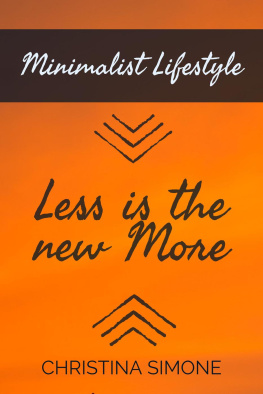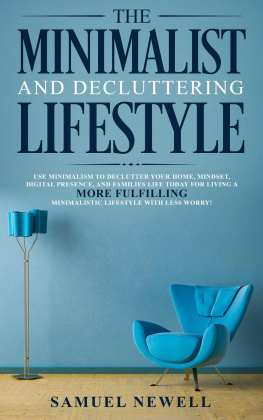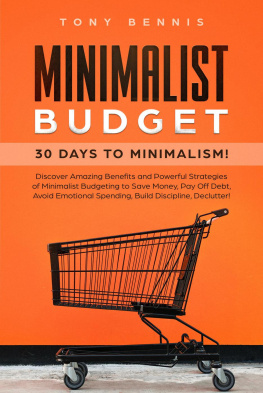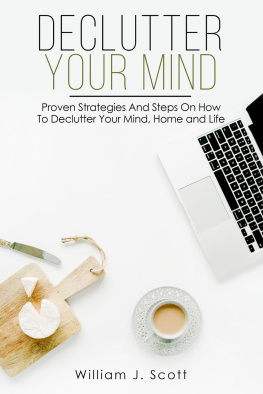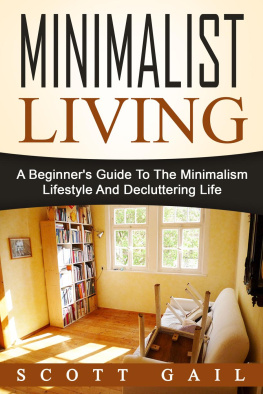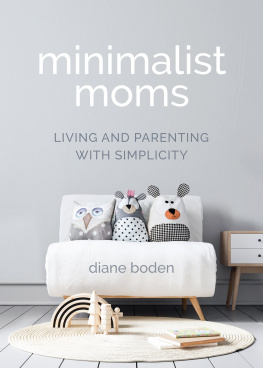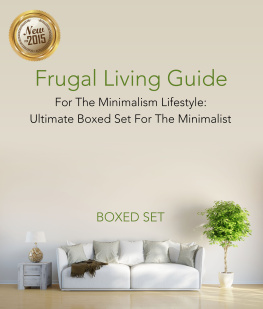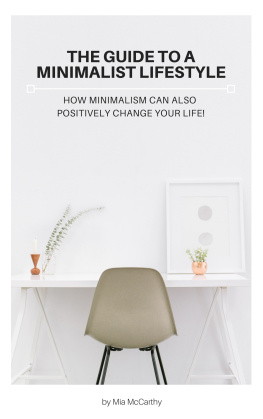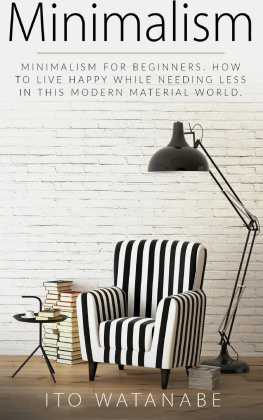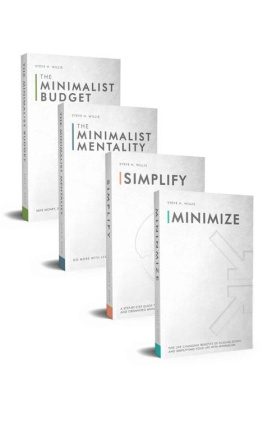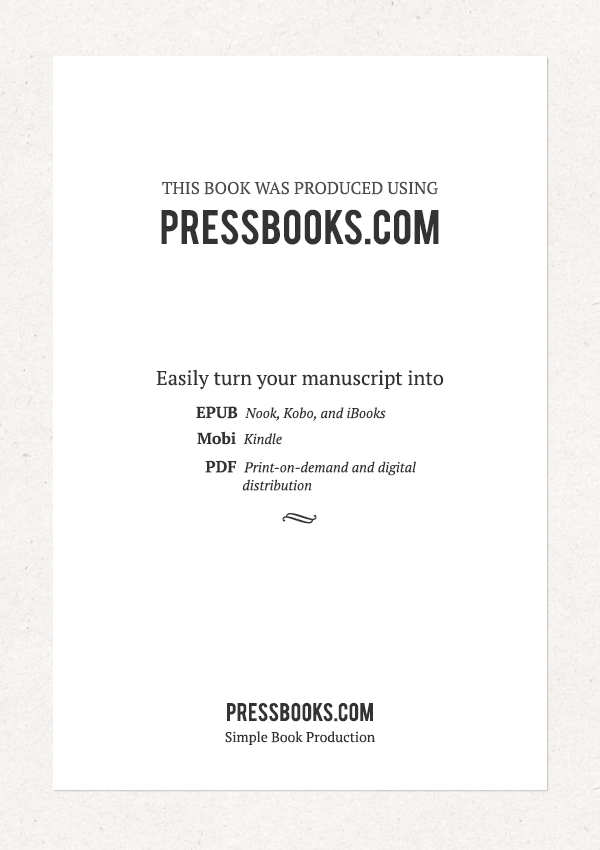A Guide to Minimalism Copyright 2014 by Amy Zulpa.
This book was produced using PressBooks.com.
More and more people are beginning to ask the question, What is minimalism? It is an indication that the concept of minimalism is making a resurgence in our society. And the answer is really quite simple. In a nutshell, minimalism is living only with what you need to survive, the bare necessities, if you will. Of course, there is a more in depth way to define the lifestyle known as minimalism.
Minimalism Is a Planned Lifestyle
It is denoted by intentionality, purpose and clarity. Minimalism is a focus on the things that are deemed the most important to an individual and a shedding of all things that are not of importance or that will simply be taking up space without purpose. In the long run, it makes the individual who chooses to be a minimalist, modify practically all aspects of their life, making it more positive.
Minimalism Frees the Individual from the Lure of Material Possessions
Nowadays a persons status and wealth is marked by how many things they own. The general thought is that more is better and that the more you have, the happier you will be and that happiness is just a purchase away. This is not the truth, but the sad thing is that so many people believe that it is so. Minimalism frees an individual from that train of thought. The concept of minimalism dispels that of consumerism and encourages people to be happy without all the purchases. More value is placed on bonding with others and fostering other relationships.
Minimalism Frees an Individual from the Trappings of Modern Society
Nowadays everything is extremely fast paced. Everything has to be done in a hurry, and as a result of that, the levels of stress are elevated. A lot of people work for a countless number of hours just to pay the bills, but in the long run they just end up being more indebted than they were initially. The concept of multitasking is also trending as people try to fit more tasks into the day. The unfortunate thing is that nothing ever seems to be accomplished. The world is now more hi-tech so the value of seeing an individual face to face is no longer a necessity as smartphones and other devices allow people to make contact. What minimalism does is to slow everything down, and resets the individual. Time is taken to appreciate things, and value is added to life as things are seen differently and not like a scene through the window in a bullet train.
Minimalism Eliminates the Dual Personality
Having a dual personality is not something that anyone chooses to do, but more often than not that is the case in todays society. What happens is that an individual has a life with their family which is different from their work life and different from the way they relate to their neighbors. Depending on how the individual has chosen to present himself, a certain image has to be kept up. The personality that an individual has is basically controlled by work demands and what the advertisements say the ideal lifestyle is. Minimalism refutes all that and provides a life that is the same in all scenarios. Everything is much simpler and the stress is much less as well. There is no fluctuating personality.
Minimalism Is the Same All Over the World
The world we live in is one driven by consumerism and what the celebrities are doing. Some people have come to a point where their lives are controlled by what the tabloids say is trending or what the celebrities are wearing or doing. The minimalist does not care about all of that. The media does not control the lifestyle. In spite of all this, the minimalist lifestyle is enriching and fulfilling. While the consumerist driven individuals are focused on fame, glamour and success, the minimalist is focused on the opposite. The lifestyle is slow, quiet and simple. Enjoyment is much greater though life is not as fast paced and the consumption is less. When a consumerist encounters a minimalist, they often find that they are focused on the wrong thing all along.
Minimalism Is Internal, Not External
There are a couple of tenets that minimalism is founded on. These principles help the individual to declutter their life and home as well as finances. Though all of this is great, the main focus is on clearing the mind. Once the mind is free from clutter, the individual will be able to think much more clearly and the minimalist lifestyle will fall into place.
Minimalism Can Be Achieved By All
Anyone can become a minimalist with the right tools in hand. There are quite a number of families who can attest to that. Many start out trying to be all that they can be with the house and the boat and the value of the material possessions they have as the main focus. When minimalism takes the primary focus, all that becomes less important; the focus now becomes less focused on the material and more on the emotional and spiritual.
Minimalism is a lifestyle that many seek, but somehow find so elusive to achieve.
2
How to Become a Minimalist
Minimalism comes with many benefits and challenges. One of the most difficult parts of minimalism is getting started. Shifting from the standard assumption that more is better to a lifestyle that advocates for owning fewer items can be difficult. Along the way you may meet resistance from family, friends, and yourself. In order to deal with that resistance it is important to have a solid understanding of minimalism and a plan for implementing it in your life.
Understanding Minimalism
There are several types of minimalism. For some people, minimalism is a type of organization built around the principle that less is more. For others, minimalism extends into a sense of aesthetics, influencing their choices in art, home design, and architecture. It is important for you to know which parts of minimalism are important to you. At the same time you should realize that as you embark on a minimalist lifestyle your preferences may change regarding art and aesthetics.
Basic minimalism starts with the idea that material goods can both add and detract from our quality of life. Owning too much can cause clutter, both physically and mentally. The maintenance required when you own too much stuff can take time away from participating in activities that develop you as a person and help you to make real connections with people. For this reason, minimalists choose to get rid of the items that they do not need in their daily life. How extreme you decide to go with your de-cluttering is up to you. Some minimalists participate in the, 100 Things, challenge, owning less than 100 items. Others simply seek to reduce their number of belongings without an end-goal in mind. Before you embark on your minimalist journey you should take some time to consider what your personal goals are.



